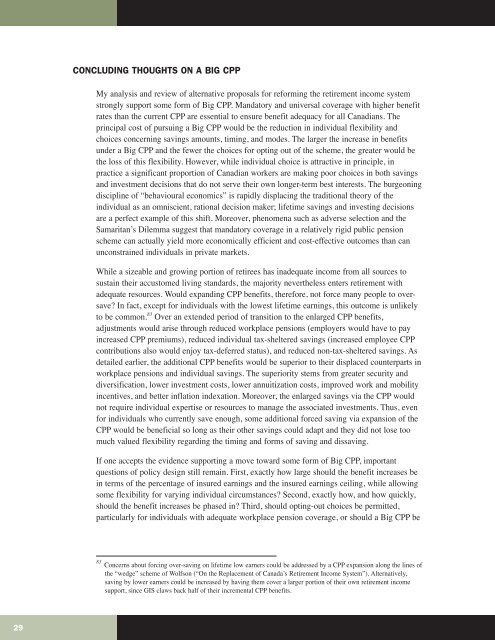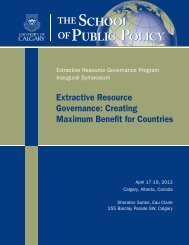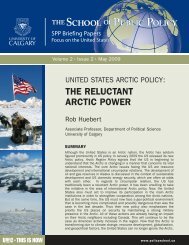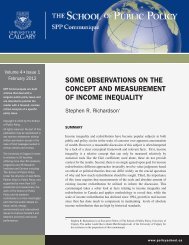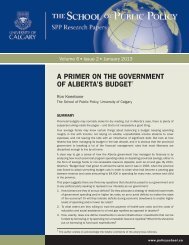EXPANDING CANADA PENSION PLAN RETIREMENT BENEFITS Assessing Big CPP Proposals
EXPANDING CANADA PENSION PLAN RETIREMENT BENEFITS ...
EXPANDING CANADA PENSION PLAN RETIREMENT BENEFITS ...
You also want an ePaper? Increase the reach of your titles
YUMPU automatically turns print PDFs into web optimized ePapers that Google loves.
CONCLUDING THOUGHTS ON A BIG <strong>CPP</strong>My analysis and review of alternative proposals for reforming the retirement income systemstrongly support some form of <strong>Big</strong> <strong>CPP</strong>. Mandatory and universal coverage with higher benefitrates than the current <strong>CPP</strong> are essential to ensure benefit adequacy for all Canadians. Theprincipal cost of pursuing a <strong>Big</strong> <strong>CPP</strong> would be the reduction in individual flexibility andchoices concerning savings amounts, timing, and modes. The larger the increase in benefitsunder a <strong>Big</strong> <strong>CPP</strong> and the fewer the choices for opting out of the scheme, the greater would bethe loss of this flexibility. However, while individual choice is attractive in principle, inpractice a significant proportion of Canadian workers are making poor choices in both savingsand investment decisions that do not serve their own longer-term best interests. The burgeoningdiscipline of “behavioural economics” is rapidly displacing the traditional theory of theindividual as an omniscient, rational decision maker; lifetime savings and investing decisionsare a perfect example of this shift. Moreover, phenomena such as adverse selection and theSamaritan’s Dilemma suggest that mandatory coverage in a relatively rigid public pensionscheme can actually yield more economically efficient and cost-effective outcomes than canunconstrained individuals in private markets.While a sizeable and growing portion of retirees has inadequate income from all sources tosustain their accustomed living standards, the majority nevertheless enters retirement withadequate resources. Would expanding <strong>CPP</strong> benefits, therefore, not force many people to oversave?In fact, except for individuals with the lowest lifetime earnings, this outcome is unlikelyto be common. 83 Over an extended period of transition to the enlarged <strong>CPP</strong> benefits,adjustments would arise through reduced workplace pensions (employers would have to payincreased <strong>CPP</strong> premiums), reduced individual tax-sheltered savings (increased employee <strong>CPP</strong>contributions also would enjoy tax-deferred status), and reduced non-tax-sheltered savings. Asdetailed earlier, the additional <strong>CPP</strong> benefits would be superior to their displaced counterparts inworkplace pensions and individual savings. The superiority stems from greater security anddiversification, lower investment costs, lower annuitization costs, improved work and mobilityincentives, and better inflation indexation. Moreover, the enlarged savings via the <strong>CPP</strong> wouldnot require individual expertise or resources to manage the associated investments. Thus, evenfor individuals who currently save enough, some additional forced saving via expansion of the<strong>CPP</strong> would be beneficial so long as their other savings could adapt and they did not lose toomuch valued flexibility regarding the timing and forms of saving and dissaving.If one accepts the evidence supporting a move toward some form of <strong>Big</strong> <strong>CPP</strong>, importantquestions of policy design still remain. First, exactly how large should the benefit increases bein terms of the percentage of insured earnings and the insured earnings ceiling, while allowingsome flexibility for varying individual circumstances? Second, exactly how, and how quickly,should the benefit increases be phased in? Third, should opting-out choices be permitted,particularly for individuals with adequate workplace pension coverage, or should a <strong>Big</strong> <strong>CPP</strong> be83 Concerns about forcing over-saving on lifetime low earners could be addressed by a <strong>CPP</strong> expansion along the lines ofthe “wedge” scheme of Wolfson (“On the Replacement of Canada’s Retirement Income System”). Alternatively,saving by lower earners could be increased by having them cover a larger portion of their own retirement incomesupport, since GIS claws back half of their incremental <strong>CPP</strong> benefits.29


